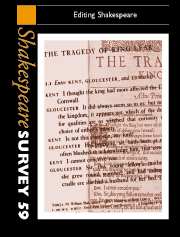Book contents
- Frontmatter
- Editing Shakespeare’s Plays in the Twentieth Century
- Crisis in Editing?
- On Being a General Editor
- Altering the Letter of Twelfth Night: ‘Some are born great’ and the Missing Signature
- ‘A Thousand Shylocks’: Orson Welles and The Merchant of Venice
- The Date and Authorship of Hand D’s Contribution to Sir Thomas More: Evidence from ‘Literature Online’
- Ferdinand’s Wife and Prospero’s Wise
- Editing Stefano’s Book
- Manuscript, Print and the Authentic Shakespeare: The Ireland Forgeries Again
- The Author, the Editor and the Translator: William Shakespeare, Alexander Chalmers and Sándor Petofi or the Nature of a Romantic Edition
- Women Edit Shakespeare
- The Shakespeare Edition in Industrial Capitalism
- Print and Electronic Editions Inspired by the New Variorum Hamlet Project
- The Evolution of Online Editing: Where Will it End?
- The Director as Shakespeare Editor
- The Editor as Translator
- Performance Editions, Editing and Editors
- Editing Collaborative Drama
- Will in the Universe: Shakespeare’s Sonnets, Plato’s Symposium, Alchemy and Renaissance Neoplatonism
- Giants and Enemies of God: The Relationship between Caliban and Prospero from the Perspective of Insular Literary Tradition
- Shakespeare’s Ages
- Who Wrote William Basse’s ‘Elegy on Shakespeare’?: Rediscovering a Poem Lost from the Donne Canon
- ‘Sometime a Paradox’: Shakespeare, Diderot and the Problem of Character
- Shakespeare Performances in England, 2005
- Professional Shakespeare Productions in the British Isles, January–December 2004
- The Year's Contributions to Shakespearian Study 1 Critical Studies
- 2 Shakespeare in Performance
- 3 Editions and Textual Studies
- Index
Crisis in Editing?
Published online by Cambridge University Press: 28 March 2007
- Frontmatter
- Editing Shakespeare’s Plays in the Twentieth Century
- Crisis in Editing?
- On Being a General Editor
- Altering the Letter of Twelfth Night: ‘Some are born great’ and the Missing Signature
- ‘A Thousand Shylocks’: Orson Welles and The Merchant of Venice
- The Date and Authorship of Hand D’s Contribution to Sir Thomas More: Evidence from ‘Literature Online’
- Ferdinand’s Wife and Prospero’s Wise
- Editing Stefano’s Book
- Manuscript, Print and the Authentic Shakespeare: The Ireland Forgeries Again
- The Author, the Editor and the Translator: William Shakespeare, Alexander Chalmers and Sándor Petofi or the Nature of a Romantic Edition
- Women Edit Shakespeare
- The Shakespeare Edition in Industrial Capitalism
- Print and Electronic Editions Inspired by the New Variorum Hamlet Project
- The Evolution of Online Editing: Where Will it End?
- The Director as Shakespeare Editor
- The Editor as Translator
- Performance Editions, Editing and Editors
- Editing Collaborative Drama
- Will in the Universe: Shakespeare’s Sonnets, Plato’s Symposium, Alchemy and Renaissance Neoplatonism
- Giants and Enemies of God: The Relationship between Caliban and Prospero from the Perspective of Insular Literary Tradition
- Shakespeare’s Ages
- Who Wrote William Basse’s ‘Elegy on Shakespeare’?: Rediscovering a Poem Lost from the Donne Canon
- ‘Sometime a Paradox’: Shakespeare, Diderot and the Problem of Character
- Shakespeare Performances in England, 2005
- Professional Shakespeare Productions in the British Isles, January–December 2004
- The Year's Contributions to Shakespearian Study 1 Critical Studies
- 2 Shakespeare in Performance
- 3 Editions and Textual Studies
- Index
Summary
For the first time in fifty-four years, the editors of Shakespeare Survey have devoted an issue to ‘Editing Shakespeare’. Perhaps they are motivated by a concern that has been gaining in currency since at least as early as 1988, when Randall McLeod chose ‘Crisis in Editing’ as the theme for the annual Conference on Editorial Problems at the University of Toronto. The Division of the Kingdoms had appeared five years earlier and McLeod’s own ‘UN Editing Shak-speare’ a year before that; but ‘Crisis in Editing’ extended its claims beyond the special problems of the Lear text or any particular quarrel with received opinion to suggest that editing itself was in a critical condition.
This idea, in one form or another, has been in regular circulation ever since. In 1993, Margreta de Grazia and Peter Stallybrass, reflecting on the proliferation of Lear versions, foresaw ‘a radical change indeed’ not just in textual criticism but in all forms of Shakespearian practice. ‘As a result of this multiplication, Shakespeare studies will never be the same.’ The editors of two recent collections on editorial matters claim we are in the midst of a transformation analogous to the sweeping institutional and conceptual revolutions – the new maps, the Reformation, print dissemination – of the Renaissance itself. Implicit in these momentous re-enactments is the notion of a paradigm shift and, in the most recent Cambridge Companion, Barbara Mowat adopts this idea as the organizing principle for her analysis, concluding with a catalogue of the recently produced ‘paradigm-threatening’ critiques as a result of which ‘hardly a “fact” supporting New Bibliographical assumptions remains standing’.
- Type
- Chapter
- Information
- Shakespeare Survey , pp. 20 - 38Publisher: Cambridge University PressPrint publication year: 2006
- 2
- Cited by

